Inventions
Insect Aircraft
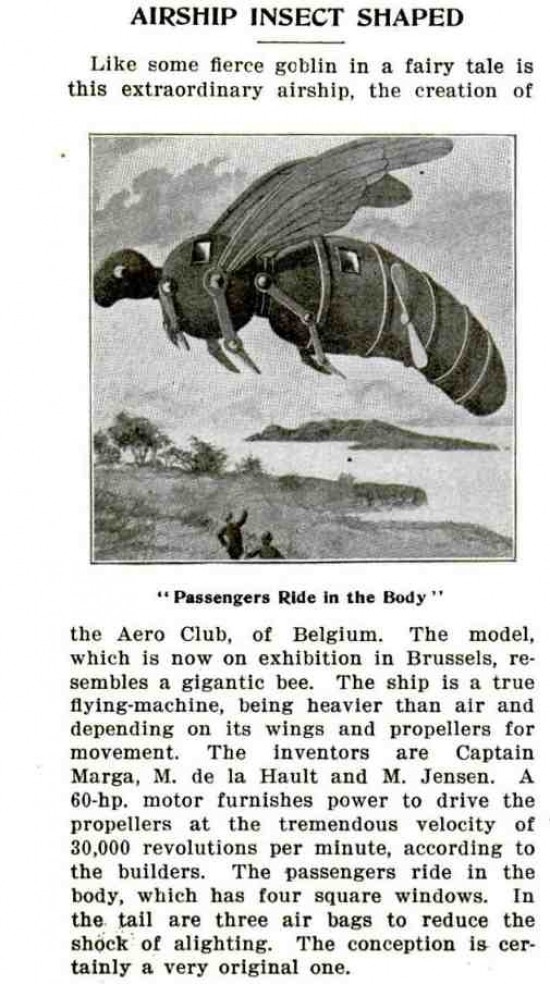
This 1906 article is the lone reference I can find on the internet to this craft, and I suspect it never existed except on paper.
Posted By: Paul - Thu Oct 08, 2015 -
Comments (17)
Category: Insects and Spiders, Inventions, Air Travel and Airlines, 1900s, Europe
The Wrist Twist Steering Wheel
March 1965: The Lincoln-Mercury division of Ford Motor Co. began testing the "wrist twist" steering wheel at dealerships around the country. With this "no-wheel steering wheel," the driver controlled the car by means of two rotating plastic rings, five-inches in diameter. The rings turned simultaneously and could be turned with one or both hands.As the video below explains, the benefit of the "wrist twist" was that you could more easily rest your arms on armrests while driving.
I guess the drawback was that you got carpal tunnel syndrome in your wrists by constantly having to twist them around.
More info: Popular Science - Apr 1965

Posted By: Alex - Tue Oct 06, 2015 -
Comments (21)
Category: Inventions, 1960s, Cars
Toilet Sanitary Shield For Men
Florida inventor Vladimir Laurent recently received a patent for a device which he describes as a "toilet sanitary shield for male genitalia." From his patent application:Laurent told the South Florida Business Journal, "It's a home product and it's designed for a specific need, for something that I felt was needed, personally." He also said that he's spent "between $25,000 and $30,000" on developing the product.
His patent included a line drawing (below) which illustrates his device being used. I've put a purple circle over the male dangly bit, in order to avoid any risk of offending that company which pays our web hosting bill (because that company is easily offended). You can see the unaltered patent image at the South Florida Biz Journal link above.
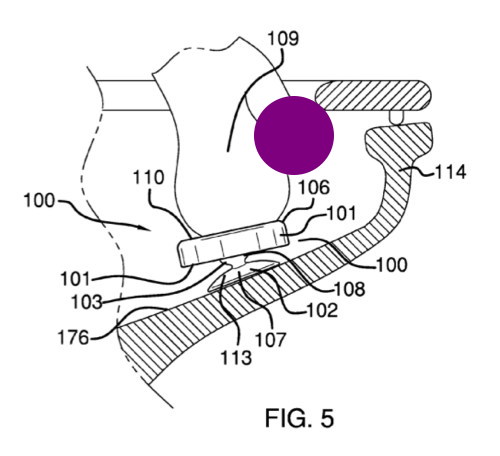
Posted By: Alex - Mon Oct 05, 2015 -
Comments (13)
Category: Bathrooms, Inventions, Patents, Genitals
The Violaeol
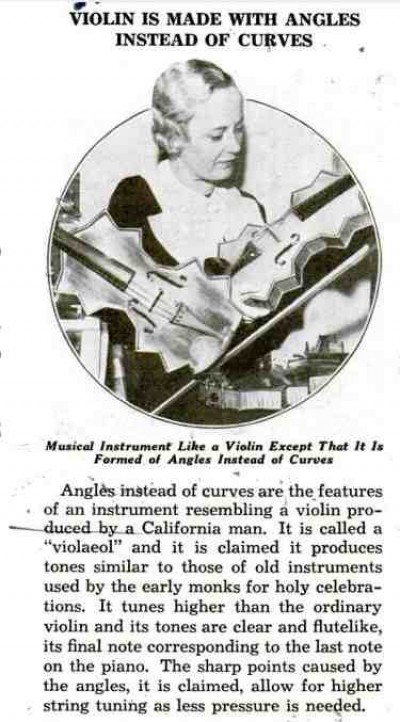
Original article here.
In 1935, one Alfred Grosjean (as named in a separate TIME magazine article) invented the "violaeol."
Some years later, luthier Josh Rieck recreated one for his own use.

Posted By: Paul - Sat Sep 26, 2015 -
Comments (2)
Category: Inventions, Music, 1930s
MacLevy Leg Massager

Image source: Time magazine - April 19, 1948
Displayed at a Beauty Shop trade convention in Manhattan's Grand Central Palace, April 1948.
The machine (the MacLevy Leg Massager) was marketed to beauty shop owners. The introduction of home permanent wave kits in the mid-1940s had caused a steep decline in business for beauty shops, so the inventors of machines such as the leg massager were promising the shop owners that they could lure customers back by installing gadgets such as this, which would allow them to offer new services without having to hire trained masseuses.
The leg massager was invented by Monte MacLevy, who filed a patent application for it in July 1939. From the patent:

Posted By: Alex - Mon Sep 21, 2015 -
Comments (6)
Category: Inventions, Patents, 1940s
Electric Exercise Gloves
Posted By: Paul - Thu Sep 10, 2015 -
Comments (6)
Category: Inventions, Bodybuilding
Multirotor Super Drone
The high-tech equivalent of attaching helium balloons to a lawn chair. Except it doesn't work as well.
Posted By: Alex - Sat Sep 05, 2015 -
Comments (5)
Category: Inventions, Air Travel and Airlines
Bulletproof Wheat
I wonder whatever became of this miracle product. If Larry Rogers, its inventor, was 31 in 1984, then he'd be 62 now. Is he still working away on it somewhere? Or did the product actually make its way onto the market, though under a name other than "bulletproof wheat"? Who knows. I can't find any follow-up info about the story.
Spokane Chronicle - Sep 24, 1984
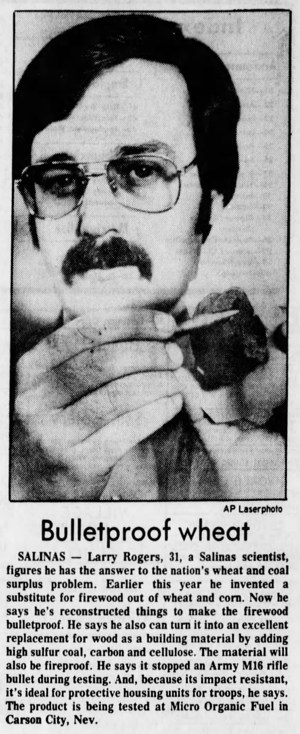
Santa Cruz Sentinel - Sep 18, 1984
Posted By: Alex - Tue Aug 18, 2015 -
Comments (7)
Category: Inventions, 1980s
Cattle Delivery Via Motorcycle
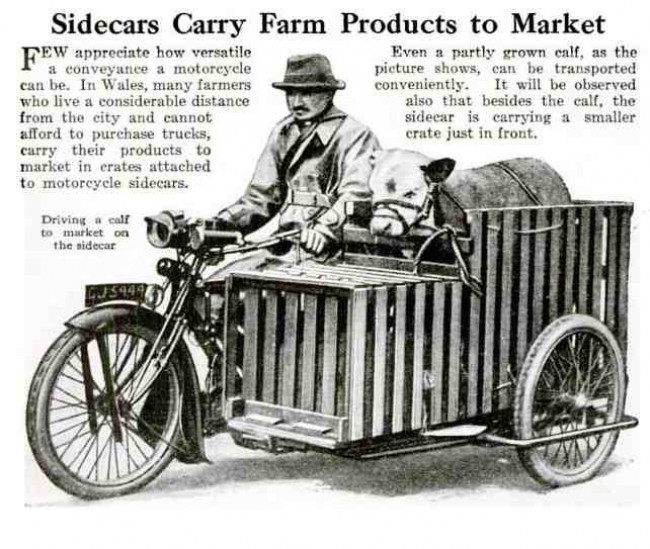
I really wish this practice had caught on, for I would be delighted to be driving down a highway and see such a sight.
Original article here.
Posted By: Paul - Tue Jul 28, 2015 -
Comments (2)
Category: Animals, Farming, Inventions, 1920s, Motorcycles
Holmes & Yoyo
In the view of some: Worst. Show. Ever.
Wikipedia page here.
Posted By: Paul - Fri Jul 17, 2015 -
Comments (7)
Category: Ineptness, Crudity, Talentlessness, Kitsch, and Bad Art, Inventions, Robots, Television, 1970s

| Who We Are |
|---|
| Alex Boese Alex is the creator and curator of the Museum of Hoaxes. He's also the author of various weird, non-fiction, science-themed books such as Elephants on Acid and Psychedelic Apes. Paul Di Filippo Paul has been paid to put weird ideas into fictional form for over thirty years, in his career as a noted science fiction writer. He has recently begun blogging on many curious topics with three fellow writers at The Inferior 4+1. Contact Us |




